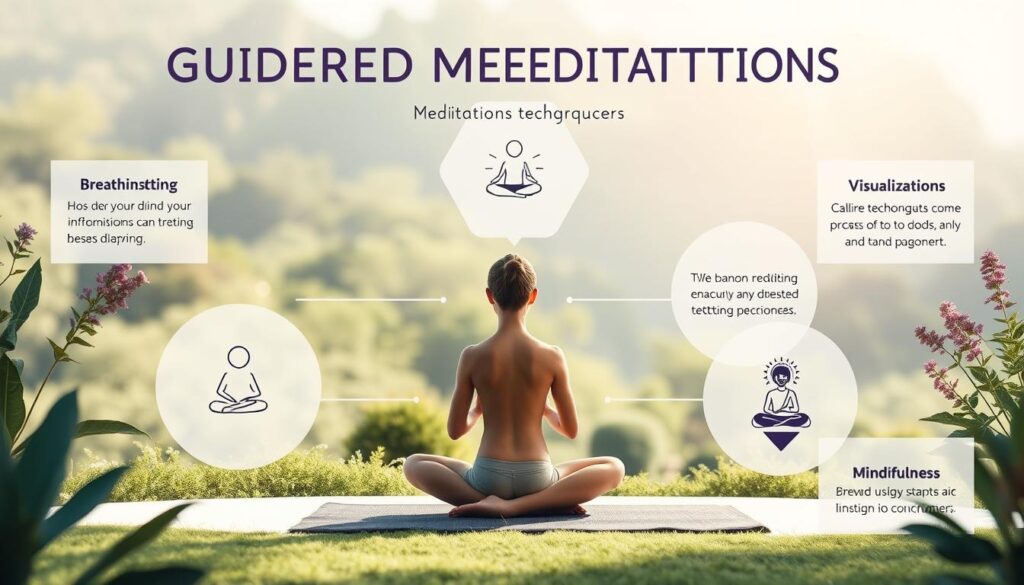I still remember the countless times I’ve felt overwhelmed by the demands of daily life – the endless emails, the tight deadlines, and the constant din of notifications. It’s like being caught in a never-ending storm, isn’t it? That’s when I discovered the transformative power of guided meditation for stress relief.
As I started practicing meditation, I began to experience its health benefits firsthand. I felt more centered, more focused, and more at peace. It was as if I had found a sanctuary within myself, a place where I could retreat from the chaos and recharge.
As more people discover the many health benefits of this simple yet powerful practice, the popularity of meditation continues to grow. In just a short time, you can start experiencing the positive changes that regular meditation can bring to your life.
Key Takeaways
- Guided meditation is a powerful tool for managing daily stress.
- Regular meditation practice can bring significant positive changes to your life.
- Meditation is accessible to everyone, regardless of their background or spiritual beliefs.
- You can start experiencing the health benefits of meditation in just a short time.
- Meditation can help you develop other beneficial habits and feelings.
Understanding Stress and How Meditation Helps
Understanding how stress affects our bodies is crucial to mitigating its negative effects. Stress is not just a mental state; it has profound physical implications. When we’re stressed, our body’s “fight-or-flight” response is triggered, releasing hormones like cortisol and adrenaline into our system.
The Science Behind Stress Response
The stress response is a natural reaction that was once vital for our survival. However, in modern times, chronic stress can lead to a host of health issues.Too much cortisol can increase blood sugar levels, suppress the immune system, and constrict blood vessels, ultimately contributing to conditions like hypertension and heart disease.
| Stress Hormone | Effects on the Body |
|---|---|
| Cortisol | Increases blood sugar levels, suppresses immune system |
| Adrenaline (Epinephrine) | Increases heart rate, blood pressure |
How Meditation Activates the Parasympathetic Nervous System
Meditation plays a crucial role in countering the effects of stress by activating the parasympathetic nervous system, or the “rest and digest” mode. This activation helps toreduce stress hormonesand promote relaxation, lowering blood pressure and heart rate. Regular meditation practice can lead to measurable changes in brain activity and stress hormone levels, making it easier for the body to recover from stress.
By understanding the science behind stress and how meditation helps, we can better appreciate the benefits of incorporating meditation into our daily lives to improve our overall health and well-being.
The Key Benefits of Meditation for Stress Management
Meditation offers a multitude of benefits for managing stress, and it’s backed by research. When we meditate, our body undergoes several physiological changes that help in reducing stress.
Physiological Changes During Meditation Practice
During meditation practice, our breathing slows down, and muscle tension decreases, signaling the body to enter a state of deep relaxation. This relaxation response is facilitated by the parasympathetic nervous system, which counters the effects of stress.
Long-Term Effects on Stress Hormones
Regular meditation has been shown to decrease the levels of stress hormones like cortisol. According to a study found by the University of California, Davis, individuals who practiced generalized meditation programs had lower cortisol levels. Another study highlighted that medical students using Headspace for just 10 days experienced a 12% decrease in stress, while a 30-day practice led to a reduction of stress by a third.
| Duration of Meditation Practice | Reduction in Stress Levels |
|---|---|
| 10 days | 12% |
| 30 days | 33% |
Reducing Anxiety Through Regular Meditation
Meditation has emerged as a powerful tool in the quest to reduce anxiety and improve mental well-being. By incorporating meditation into your daily routine, you can experience a significant decrease in anxiety symptoms.
How Meditation Decreases Anxiety Symptoms
Meditation helps by creating a space between you and your worries, breaking the cycle of anxious thoughts. Through mindfulness meditation, you can observe anxious thoughts without getting caught up in them, leading to improved stress reactivity and coping.
Research-Backed Evidence for Anxiety Relief
Studies have shown that meditation can be effective in reducing anxiety. A 2014 meta-analysis found that meditation decreased anxiety in nearly 1,300 adults, with the most significant effects in those with the highest levels of anxiety. Another study found that 8 weeks of mindfulness meditation helped reduce anxiety symptoms in people with generalized anxiety disorder.
As one study found, people who used a mindfulness meditation app for 8 weeks experienced improved feelings of well-being and decreased distress. Meditation may also help control job-related anxiety and also improve overall mental health conditions.
Enhancing Emotional Health and Resilience
Through regular meditation, we can improve our emotional health and develop a more resilient mindset. As we practice meditation, we can experience a significant shift in our emotional well-being.
One of the key benefits of meditation is its ability to help us develop a positive outlook on life. Some forms of meditation can lead to improved self-image and a more positive outlook on life. For instance, a study found that mindfulness meditation improved symptoms of depression in more than 3,500 adults.
Developing a Positive Outlook on Life
As we practice meditation, we can start to notice a change in our outlook on life. We can become more optimistic and hopeful, which can have a significant impact on our overall well-being. A study found that people who completed a meditation exercise experienced fewer negative thoughts when viewing negative images.
Managing Negative Thoughts and Depression
Meditation can also help us manage negative thoughts and depression. By practicing mindfulness meditation, we can create space between ourselves and our thoughts, allowing us to recognize negative patterns without being consumed by them.
“Meditation can help us see our thoughts as just thoughts, rather than absolute truths.”
We can observe the effects of meditation on our mental health in the following table:
| Meditation Practice | Effects on Mental Health |
|---|---|
| Mindfulness meditation | Reduced symptoms of depression |
| Regular meditation practice | Improved emotional resilience |
| Cognitive defusion | Ability to see thoughts as just thoughts |
As we continue to practice meditation, we can experience numerous benefits for our emotional health, including a more positive outlook on life and better management of negative thoughts.

Improving Sleep Quality with Guided Meditation
Many of us struggle with sleep in today’s hyper-connected world, but guided meditation offers a powerful solution. As we navigate the demands of modern life, it’s easy to overlook the importance of a good night’s sleep. However, neglecting sleep can have serious consequences on our overall health, making it crucial to find effective solutions.
Addressing Insomnia
A 2014 study found that mindfulness-based meditation programs significantly improved sleep quality in participants. By becoming skilled in meditation, individuals can better control the racing thoughts that often lead to insomnia. This skill helps relax the body and mind, easing into a peaceful state conducive to sleep.
Creating a Pre-Sleep Routine
Establishing a pre-sleep meditation routine can signal to your body that it’s time to wind down. By incorporating guided meditation into your nightly routine, you can improve the quality of your sleep. Regular practice helps regulate your sleep-wake cycle, leading to better rest and recovery.
As you explore guided meditation for sleep, remember that consistency is key. By making meditation a regular part of your daily routine, you can experience the benefits of improved sleep quality and wake up feeling refreshed and rejuvenated.
Boosting Focus and Attention Span
Our ability to focus is like a muscle that can be strengthened with the right training. In this case, meditation is the weightlifting for our attention span.
Focused attention meditation helps increase our attention span’s strength and endurance. For instance, research has shown that people who practiced meditation performed better on visual tasks and had greater attention spans.
Meditation as Mental Training for Concentration
Meditation works as a form of mental training, teaching our mind to notice when it wanders and gently bring it back. This skill enhances our ability to maintain clarity in our daily tasks.
Studies on Cognitive Benefits of Regular Practice
One study found that people who listened to a meditation tape experienced improved attention and accuracy. Another study found that meditating for just 13 minutes daily enhanced memory and attention after 8 weeks.

| Study | Duration | Results |
|---|---|---|
| Study 1 | 8 weeks | Improved attention and accuracy |
| Study 2 | 8 weeks | Enhanced memory and attention |
| Study 3 | – | Better performance on visual tasks |
Cultivating Self-Awareness and Compassion
By practicing meditation, we can cultivate self-awareness and develop a kinder attitude toward ourselves and others. This practice can help us become more aware of our thoughts and emotions, and make conscious choices to steer them toward more constructive patterns.
Developing Kindness Toward Yourself
Some forms of meditation, like Metta meditation or loving-kindness meditation, begin with developing kind thoughts and feelings toward yourself. As we practice, we learn to extend this kindness and forgiveness to others, starting with friends, then acquaintances, and ultimately those we may consider enemies. Research has shown that this type of meditation can increase our compassion toward ourselves and others.
Extending Compassion to Others
As we gain greater awareness of our thought habits through meditation, we can recognize harmful or self-defeating thoughts and change them. A meta-analysis of 22 studies on Metta meditation demonstrated its ability to increase people’s compassion toward themselves and others. This practice can help us develop a more positive outlook on life and foster deeper connections with others.
Here is a summary of the benefits of Metta meditation:
| Benefits | Effects on Self | Effects on Others |
|---|---|---|
| Increased compassion | More kindness toward oneself | More empathy toward others |
| Improved thought patterns | Less self-criticism | Better relationships |
| Enhanced emotional health | More positive outlook | Deeper connections |
Physical Health Benefits of Meditation
Meditation isn’t just good for the mind; it has a significant impact on our physical health too. Regular practice can lead to various physiological changes that contribute to overall well-being.
Lowering Blood Pressure and Heart Rate
Meditation has been shown to have a positive effect on cardiovascular health by reducing blood pressure and heart rate. High blood pressure can lead to serious conditions like heart disease and stroke. A 2015 meta-analysis found that meditation helped reduce blood pressure, especially among older participants and those with higher initial readings. By lowering the strain on the heart, meditation can contribute to better overall heart health.
Reducing Inflammation and Pain
Chronic inflammation is linked to various serious diseases, including cancer, diabetes, and heart disease. Research has indicated that meditation can help reduce inflammation by affecting the genes involved in the inflammatory response. Additionally, people who meditate regularly may experience a reduction in chronic pain due to changes in how the brain processes pain signals. This makes meditation a valuable complement to medical treatment for conditions like arthritis.
Getting Started: Simple Guided Meditation Techniques

Simple guided meditation techniques can help you get started on your path to stress relief. As a beginner, you’ll find that meditation is easier to practice than you think.
There are mainly two simple techniques that are perfect for beginners: focused-attention meditation and open-monitoring meditation.
Focused-Attention Meditation Practice
Focused-attention meditation involves concentrating on a single object, thought, or sound. For example, you can focus on your breathing or a calming word. This practice helps train your mind to stay focused and avoid distractions.
Open-Monitoring Meditation Approach
Open-monitoring meditation, on the other hand, encourages you to observe all aspects of your environment, thoughts, and feelings without judgment. This practice develops your awareness and helps you stay in the present time.
To start practicing these techniques, dedicate just a few minutes each day. As you continue with regular meditation practice, you’ll find it easier to manage your thoughts and reduce stress.
Conclusion: Incorporating Meditation Into Your Daily Routine
The practice of meditation is more than just a stress-relief technique; it’s a powerful tool for enhancing your quality of life. By incorporating meditation into your daily routine, you can experience significant benefits, from reduced anxiety to improved emotional resilience. You don’t need special equipment or a lot of time – just a few minutes a day can make a difference. To get started, try committing to just 5 minutes of meditation daily for two weeks. With consistent practice, you’ll likely notice improvements in your stress levels, sleep quality, and overall health.
FAQ
How does meditation help reduce stress and anxiety?
Meditation helps by activating the parasympathetic nervous system, which promotes relaxation and reduces stress hormones like cortisol, leading to a decrease in anxiety symptoms.
Can meditation really help improve our sleep quality?
Yes, meditation can help improve sleep quality by relaxing the mind and body, making it easier to fall asleep and stay asleep through the night.
How does meditation impact our physical health?
Regular meditation practice has been shown to lower blood pressure, reduce chronic pain, and decrease inflammation, contributing to overall physical well-being.
What is the best way to start practicing meditation?
Starting with simple guided meditation techniques, such as focused-attention or open-monitoring meditation, can be a good way to begin, and using apps or guided recordings can help you stay on track.
How long do we need to meditate to see benefits?
Even short periods of meditation, such as a few minutes a day, can be beneficial, and research has shown that regular practice, even just 10-15 minutes daily, can lead to significant improvements in stress management and overall health.
Can meditation help with managing negative thoughts and depression?
Yes, meditation can help by promoting a positive outlook, reducing rumination, and increasing compassion towards oneself, which can help manage symptoms of depression.
The final answer is:
How does meditation help reduce stress and anxiety?
Meditation helps by activating the parasympathetic nervous system, which promotes relaxation and reduces stress hormones like cortisol, leading to a decrease in anxiety symptoms.
Can meditation really help improve our sleep quality?
Yes, meditation can help improve sleep quality by relaxing the mind and body, making it easier to fall asleep and stay asleep through the night.
How does meditation impact our physical health?
Regular meditation practice has been shown to lower blood pressure, reduce chronic pain, and decrease inflammation, contributing to overall physical well-being.
What is the best way to start practicing meditation?
Starting with simple guided meditation techniques, such as focused-attention or open-monitoring meditation, can be a good way to begin, and using apps or guided recordings can help you stay on track.
How long do we need to meditate to see benefits?
Even short periods of meditation, such as a few minutes a day, can be beneficial, and research has shown that regular practice, even just 10-15 minutes daily, can lead to significant improvements in stress management and overall health.
Can meditation help with managing negative thoughts and depression?
Yes, meditation can help by promoting a positive outlook, reducing rumination, and increasing compassion towards oneself, which can help manage symptoms of depression.
